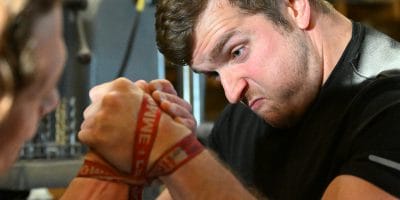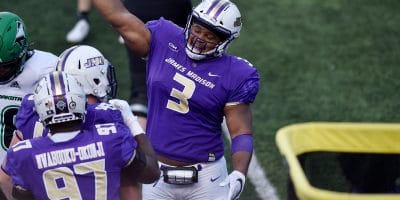By John Leonard, contributor

Darrell J. Howard called the three and a half years he spent researching Sunday Coming: Black Baseball in Virginia one of the best times of his life.
“I enjoyed it so much I could have worked a couple more years,” Howard said with a smile at the Lucy F. Simms Center on Saturday.
He spoke to a group of about 75 people about the golden era of black baseball in Virginia, lasting from the 1950s to the 1970s, when entire communities came out to watch Sunday afternoon baseball games. The event was hosted by the Shenandoah Valley Black Heritage Project in honor of Black History Month.
It was in 1999 that Howard first worked up the nerve to write a book about the baseball he remembered from his childhood. He realized, though, that he didn’t know much about the games and teams he watched as a young boy in Ivy. The Albemarle County town had its own community, the Eagles, who played in an empty field just yards from Howard’s home. Much of Howard’s research consisted of digging through boxes of old black newspapers and interviewing players from that time – now mostly old men.

Some of those aging players were in attendance on Saturday, sometimes calling out memories and sometimes chortling with glee at Howard’s. One of them was William Dowell, a former player in Elkton.
“It’s great that someone took the time to remember us,” Dowell said after the meeting. “[Those times] were great; it gave us something to do.”
The black teams played wherever they could find space, usually in empty meadows or lots cleared of debris. Bad hops caused by rocks and other natural obstacles were just a part of the game.
“Sometimes the fields were so lopsided that the outfielders needed to be told that the ball was hit their way,” Howard said. “On some fields, the catcher couldn’t see the center fielder, and on others the right fielder couldn’t see the left fielder.”
Just like in nostalgic movies, sometimes they pulled cars up and and used their headlights to illuminate the fields at night. After desegregation, these temes were allowed to play games on better-maintained school fields, like Kate Collins Middle School in Waynesboro, but were still, oddly, not allowed to practice on those fields. According to Howard, though, they decided to look on the bright side of the arrangement.
“It made the teams better, after practicing in meadows amongst rocks and cow patties,” he said.

Entire communities enjoyed these games; baseball was just an excuse to bring everyone together. Howard said that some days, crowds were so large and raucous that it was difficult to hear the person sitting next to him; cat-calling and teasing from the stands was pretty common.
“You may be trash-talked by your grandmother,” he said.
It was a cultural event, he continued: “We didn’t know how special the era was. You weren’t just playing baseball for yourself; you were playing for the community. They just played for pride.”
Harrisonburg’s team, the AC’s, was founded by legends Roscoe Burgess and Hugo Scott around 1964, and played at the Simms School. Together, the two worked to add a sense of direction and continuity to the teams, even awarding a championship starting in 1966. The Sperryville Tigers won the first title that year.
By 1979, though, almost all of the teams had stopped playing. Communities were spending time elsewhere, and the iconic age of hugely popular baseball games was over almost as quickly as it began.
“I’m proud to be one of the keepers of our history,” Howard said. “As time passes, memory fades, and it becomes harder and harder to hang on to the details. The stories bring the events alive again.”
Judging by the reactions of the former players at Lucy Simms on Saturday, the stories shared there accomplished just that.
Originally published in 2002, Sunday Coming: Black Baseball in Virginia is unfortunately out of print. Used copies on Amazon are priced between $100 and $400, while the only unused copy available is listed at $279.
Journalism is changing, and that’s why The Citizen is here. We’re independent. We’re local. We pay our contributors, and the money you give goes directly to the reporting. No overhead. No printing costs. Just facts, stories and context. Thanks for your support.













